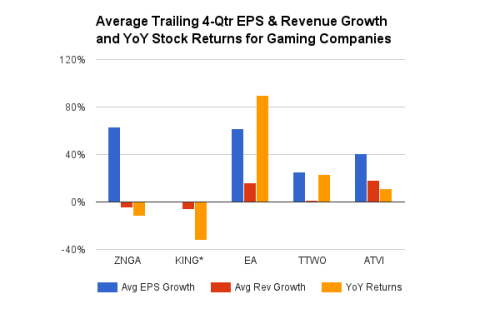Let’s face it, kids aren’t playing with toys anymore these days, they're playing with mobile devices. In recent years, sales of Barbie dolls and Matchbox cars have deteriorated, leaving traditional toy companies like Mattel (NASDAQ:MAT) in the dust. Classic toys are being left on the shelf, while not only children, but adults, increasingly spend more time playing with entertainment apps and social video games… but does the popularity of these apps mean you should invest in them?
The gaming industry is a battle of blockbusters. A single big hit can drive years of profitability for a game studio. This is true for both mobile game companies such as King Digital Entertainment (NYSE:KING) and Zynga (NASDAQ:ZNGA), as well as their console game counterparts such as Electronic Arts (NASDAQ:EA) and Activision Blizzard (NASDAQ:ATVI). However, there are a few key differences between these two spectrums of the gaming market that makes one a less risky investment.

*Note: KING’s EPS and revenue growth rates are only based on FQ1 2015 as the company IPO’d in FQ1 2014.
A Hits-Only Model
The mobile games landscape is solely a “hits” business. A hit can allow companies like King to run up huge valuations in an initial public offering if they produce one smash hit, often debuting on the stock exchange to much fanfare. But at the end of the day they will need use all of the cash they raise to hire an army of developers and they’d better come up with something at least as good as the game that got them there. There is a huge risk involved when new entertainment app and games companies take the King approach to go public because the majority of games made are commercial flops, and they can be expensive to produce. These gaming studios believed they could take customers from one game and use them as the marketing funnel for the next game in order to save on building a whole new funnel, rolling people over from game to game in perpetuity. They are finding out that this approach doesn’t work.
The business model for mobile games entails getting a user to download a game for free, then up-selling them on frequent inexpensive micro-transactions. Over the past few years King and Zynga’s respective flagship franchises, Candy Crush and FarmVille, have been monstrously successful employing this strategy. However, now these companies need to expand and diversify their revenue sources as the popularity of their hit games inevitably declines. In one year, Candy Crush went from making up 78% of King Digital’s revenue to 45%. However, the number of paying customers continues to shrink, even as the monthly active user (MAU) count is increasing and the average spend per paying customer is growing. From Q1 2014 to Q1 2015, King’s quarterly average monthly unique payers dropped to 8.5 million from 11.8 million.
Similarly, Zynga’s Farmville hit a peak of 80M users in 2010, and has been on the decline ever since as they struggle produce another popular game. And the other thing in a freefall … their stock. Since IPO-ing in late 2011, and beating their initial earnings expectations in Q1 2012, the stock peaked at $14.69 and has fallen over 80% since then. King too has seen their stock decline since IPO-ing last year, albeit at a more modest 20%. Fundamentals have also been disappointing, with both companies putting up several quarters of negative top and bottom-line growth.
The Video-Game Franchise
Video game companies on the other hand, while they also rely on hits, have the ability to build game franchises, which draw loyal followers. Unlike the freemium model mobile game companies employ, these video games titles tend to go for $50+ and are played on traditional gaming platforms such as Xbox and Playstation. Two of the most popular gaming franchises on the market are Call of Duty produced by Activision Blizzard and Grand Theft Auto produced by Take-Two Interactive. Company fundamentals often rely on the release of the next version of these games. Take the latest installment of Call of Duty: Advanced Warfare, released in November of 2014. Third quarter earnings saw growth of 188% as a result, and revenues of 78%. Similarly, Grand Theft Auto V was released in September 2013, and boosted earnings for Q3 and Q4 of that year into the triple digits, with revenues not far behind. The popularity of these games hasn’t waned, with many gamer forums debating the release of the next installments with great anticipation.
Despite the challenges faced by mobile gaming companies, that space is expected to grow to $45B by 2015. The challenge for mobile gaming studios will be to increase the number of customers who actually pay to play freemium games as well as to stave off competition. The barriers to entry are very low in this space, with new competitors entering everyday, and the landscape is becoming increasingly crowded.
